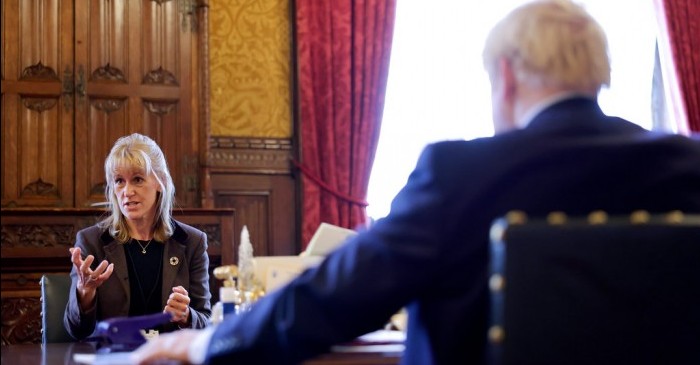NFU president Minette Batters, who has led the drive to force the Government to change its stance on scrutiny of future trade deals, said Sunday’s announcement was a ‘landmark moment’ for the UK.
Mrs Batters said: “This significant commitment to primary legislation on food standards, both in the Agriculture Bill and Trade Bill, is exactly what we have been calling for. It is a landmark moment for the people of the UK, for our countryside and the future of the food on our plates.
“This decision means everyone who cares about our trading relationships with the rest of the world – MPs, stakeholders and the public – will see independent expert advice from the Trade and Agriculture Commission on future trade deals before they are ratified.
“More than one million people signing our petition makes it one of the largest petitions this country has ever seen. Together with support from all farming organisations, animal welfare experts, environmental NGOs, politicians, some of the greatest chefs and celebrities in the country, including Jamie Oliver and Joe Wicks, and then backed by the Mail on Sunday’s campaign to save our family farms, has created an unprecedented coalition.”
Mrs Batters met Prime Minster Boris Johnson in October and, following Sunday’s announcement, she said it was ‘clear to me how much he personally cares about this issue’.
“I am delighted that he has led the government to draw a line in the sand and commit to the 2019 Conservative manifesto commitment not to undermine our farmers in future trade deals by ensuring the Trade and Agriculture Commission can report to Parliament and MPs can give proper scrutiny to future trade deals.”
“I look forward to working with the government building on our iconic British Brand reputation for high quality, healthy, sustainable British food at home and abroad.”
NPA chief executive Zoe Davies said: “This is a very significant development that will go a long way to ensuring that future trade deals do not pave the way for imports produced to standards that would not be permitted in the UK to come here.
“It is testament to the power of industry lobbying on an issue that has not only united UK farming interest, but also animal welfare and environmental organisations, the media and the British public. In the end, the Government had little choice but to act.”
Dr Davies described the Government’s failure last month to back an amendment added to the Agriculture Bill that would have added these extra scrutiny powers as a ‘missed opportunity to provide the necessary legal protection and assurance from government that our sector needs’.
The US has made it clear that it is not prepared to compromise in future trade deals on issues like the use of ractopamine in pigs and on sow stalls, which are still widely used in US pig production, but were banned in the UK in 1999. There are also vast differences in areas like environmental protection, piglet castration and antibiotic use.
She said: “Following the UK sow stall ban, retailers continued to import large volumes of cheaper pork from the EU produced using sow stalls. The impact was catastrophic as UK producers were unable to compete and went out of business – the pig herd halved in size in just a few years.
“We now finally have some hope that the Government has learned from previous experience and will ensure that history is not repeated.”
NFU Scotland president Andrew McCornick, who is a member of the TAC, said: “This is a huge step forward. There has been overwhelming public backing, celebrity endorsement and growing cross-party support for measures to be written in to legislation that recognise the outstanding standards met by the nation’s farmers and crofters and that ensure any imports coming into the UK would meet the standards that are required of UK producers.
“That has been matched by a relentless lobbying effort seeking significantly greater governance and scrutiny of the nation’s trade negotiations as we enter a new era.”
British Veterinary Association president, James Russell said: “We welcome this very important step from the Government in acknowledging the strength of feeling on the issue of protecting UK animal health and welfare standards in future trade deals.
“It’s essential that in scrutinising future trade deals the Commission draws on a wide range of veterinary expertise to put animal health and welfare at the centre of decision making. The farming community, veterinary profession, and consumers need to be reassured that the UK will not compromise our reputation for high animal welfare standards.”




